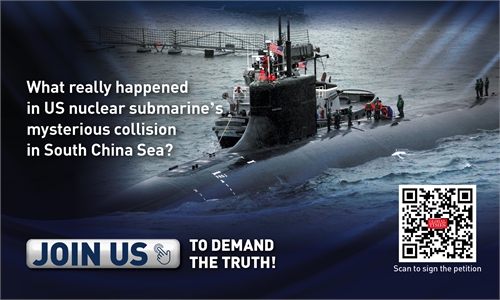
US, South China Sea Illustration: Chen Xia/GT
In recent years, hegemonism has not been weakened in the field of maritime security. On the contrary, it has become stronger and stronger. Relying on its maritime military strength, the United States frequently conducts freedom of navigation operations in other countries' waters with its warships.At the same time, Washington attempts to implement the so-called rules-based free and open maritime order designed based on its hegemonic benefits. It also uses its global discourse advantage to stigmatize China’s maritime operations, and highlight the ideological competition.
Besides, the US also tries to consolidate and enhance its regional alliance partnerships, strengthening its ability to contain China. However, US maritime hegemonism will lead to problems including disorderly competition among major powers, turbulence in the region, degradation of multilateralism, and failure of institutional governance. Therefore, we must maintain the maritime governance framework under multilateralism and oppose maritime hegemonism.
First, this entails opposing the use of military superiority to be flamboyant on the waters of other countries. In recent years, the frequency of US warships and military aircraft entering the South China Sea (SCS) has increased significantly. Equally serious is the fact that some ships sails under the guise of scientific expeditions to strengthen military reconnaissance in the SCS. This increases the risk of conflict. Since Joe Biden took office as US president, the intensity of military operations in the SCS has continued to increase.
US Warships have also alternately carried out so-called freedom of navigation operations in the Nansha and Xisha waters, frequently crossing the Taiwan Straits. The US also conducts diverse military exercises in the SCS to enhance interoperability among ships, military aircraft, and other weapons. The United States is not a claimant of the SCS. That being said, its military actions in the SCS demonstrates its ambition is to contain China. The frequent entry of US military forces into the SCS can easily lead to military misjudgments between the two major powers. This naturally increases regional security risks, and endangers regional peace and stability.
Second, opposing the creation of “rules and orders” that conform to the rights and interests of unilateral hegemony. In recent years, American politicians, think tanks, and some scholars have frequently used the "rules-based free and open maritime order” to pressure China. They are just trying to restrict China's actions with the rules and order defined by the United States. In fact, the so-called rules-based free and open maritime order is only a manifestation of American institutional hegemonism.
The United States has repeatedly emphasized rules and order, but has always refused to sign the "United Nations Convention on the Law of the Sea". The US also emphasizes the openness and freedom of the Indo-Pacific region. However, it has continued to build exclusive security groups in the region. The global maritime security order can only be a multilateral order formed under the United Nations and other multilateral frameworks. It can only be a code of conduct based on multilateral treaties such as the United Nations Convention on the Law of the Sea. Any orders based on unilateral hegemonic rights and interests can only lead to greater maritime disputes.
Third, opposing the stigmatization of ideologies and behaviors. The Trump administration intervened the SCS by stigmatizing China's ideology in the maritime sector as an important way. This has been inherited by the Biden administration. Regardless of administration, the US always hides its strategic intention to contain China under the ideological discourse narrative, describing China's maritime operations as a challenge based on values and norms. The US has stigmatized China as autocratic in the SCS. It has slandered the Communist Party of China saying that it is coercing other claimants in the SCS. It has used ideological vocabulary to attack China’s actions, including an ideological narrative that involves more allies and partnerships to contain China.
Fourth, opposing the establishment of military alliances against other countries. In recent years, the US has actively built a maritime security alliance in the Indo-Pacific region. The Quad, AUKUS, and Five Eyes Alliance countries have all become important helpers for the US to intervene in the SCS. These quasi military alliances regard China as an imaginary enemy and explicitly or implicitly take the containment of China as a common goal in military exercises and joint statements. The alliance is a product of the Cold War mentality. It can only increase the opponent's insecurity, and will ultimately lead to security dilemma between the two big powers.
History has repeatedly proved that maritime hegemony can only lead to wars and conflicts. Since the great geographical discovery of Western countries at the end of the 15th century, the ocean covering 71 percent of the earth's surface has become one of the most important arenas for power struggles. Countries that practice maritime hegemony have appeared in turn, trying to build maritime security and trade order based on their strength and unilateral interests, creating countless "human tragedies" of enslavement and anti-enslavement, oppression and anti-oppression, colonization and anti-colonization. The governance of maritime security in the new era must abandon hegemonic thinking and build an order that conforms to the majority of humanity’s interests under the framework of multilateralism.
The author is an assistant research fellow at the Research Center for Maritime Silk Road in National Institute for South China Sea Studies. opinion@globaltimes.com.cn



